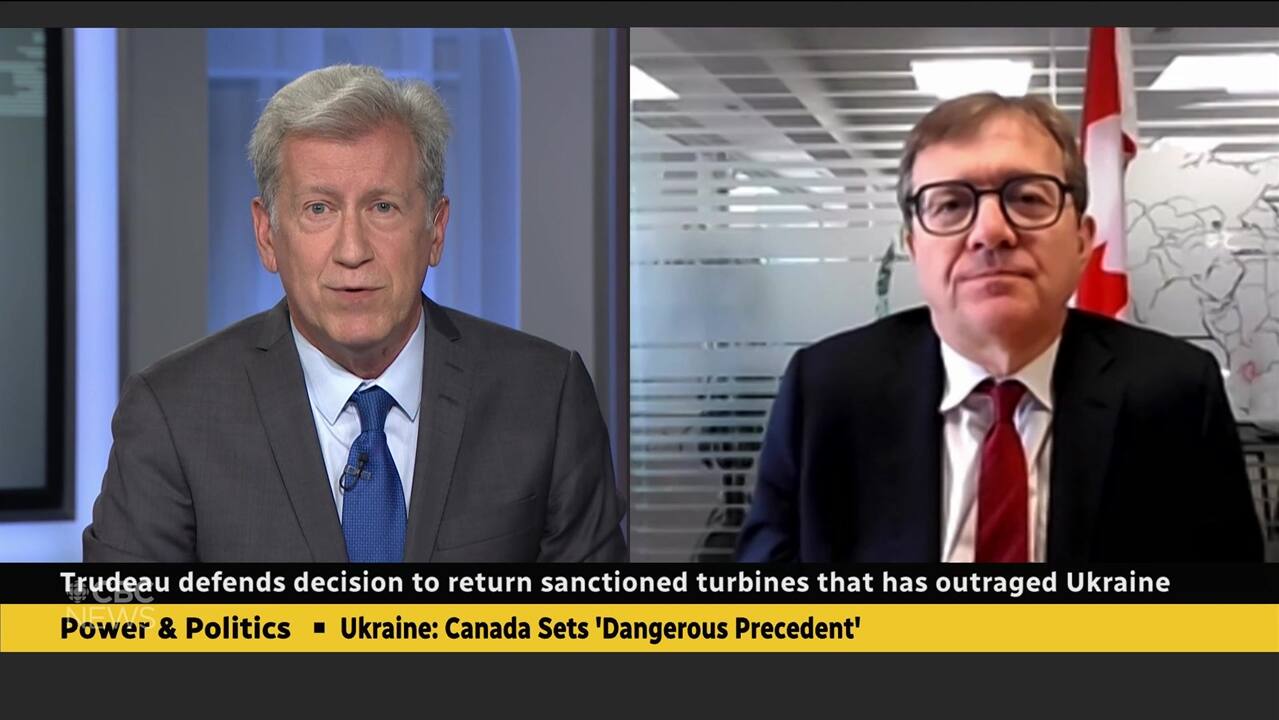[ad_1]
The move brought new worries to Germany, Italy and the other European countries that depend heavily on Russian gas piped from Vyborg, Russia to Germany’s Baltic coast.
But it also brought new questions for the government of Canada — which issued a controversial sanctions waiver that was supposed to enable Gazprom to restore normal flow to Europe, which had been reduced by about 60 per cent since June.
As of 3 a.m. ET today, the flow is reduced by 80 per cent — a rate that makes it virtually impossible for European countries that depend on Russian gas to fill their underground storage tanks for winter.
The Kremlin, which controls Gazprom, has been playing with the gas supply to Europe in an effort to weaken sanctions imposed on Russia over its invasion of Ukraine.
Russia has argued that technical issues caused by sanctions were impeding normal deliveries.
The turbine dispute
At the centre of those arguments are half-a-dozen Siemens gas turbines that compress and propel gas through the undersea pipeline. Those pipelines normally are removed from service on a regular, rotating schedule and refurbished in the Montreal workshops of Siemens Energy Canada.
But when Canada sanctioned Russia’s oil and gas sector, Siemens Energy was blocked from returning one of the turbines to Russia through Germany.
Russia warned that it would reduce the flow unless it got its turbine back. The government of German Chancellor Olaf Scholz asked Canada to make an exception to its sanctions regime to permit the turbine’s return.
“We were certainly under a lot of pressure from Germany and the European Union, and on the other side we were under pressure from the Ukrainian government,” Natural Resources Minister Jonathan Wilkinson told CBC News on July 11, one day after his government granted a “temporary” and “revocable” sanctions waiver to allow the turbine’s return.
The Trudeau government’s decision was criticized harshly by Ukrainian President Volodymyr Zelensky and by Ukrainian diaspora organizations in Canada.
Calling the Kremlin’s bluff
No one can claim the reductions in flow came as a surprise to the governments of Germany or Canada — both of which have insisted they’re not naive about Russia’s intentions.
Wilkinson told CBC News after granting the waiver that his government was well aware that Russia was using the turbine as a pretext and might not restore the full flow.
Russian President Vladimir Putin “was saying very publicly that unless the turbines were brought back, it would be our fault that Germany was losing access to Russian gas,” the minister said.
“That’s not to say that Putin may not shut it down on his own. But it’s quite a different circumstance from him being able to say that it was because of Canada’s unwillingness to assist our friends in Germany.”
WATCH: Natural Resources Minister Jonathan Wilkinson says sanctions waiver ‘not a gamble’
“We needed to take away the excuses that President Putin has as to why the Nord Stream pipeline could be shut down,” said Natural Resources Minister Jonathan Wilkinson of Canada’s decision to return sanctioned Russian turbines, insisting the decision is not a gamble.
German leaders said that their country was determined to call Putin’s bluff over the turbine, knowing full well that he could still manipulate the flow based on political calculations.
“We’re delivering now in order to keep Russia from having the excuse that we are basically inflicting harm to ourselves,” Sabine Sparwasser, Germany’s ambassador to Canada, told CBC News.
“In many experts’ opinions, it’s a pretext, but we take away that pretext. We’re delivering the turbine and then we will see whether there is a weaponization of energy by stopping the delivery or not.”
Waiver called into question
Now that Germany and Canada have the answer to that question, it raises another. What does all this mean for future turbine deliveries and the continued existence of the sanctions waiver — which is, after all, “temporary and revocable”?
As currently framed, the waiver would run for two years and allow numerous turbines to be cycled through Canada.
The exact location of the turbine already returned under the sanctions waiver is unclear. Russian media reported on July 18 that it was on its way from Germany to the Russian Portovaya compressor station.
On Tuesday, Kremlin spokesperson Dmitry Peskov claimed that it had still not reached Russia. “We hope that it will happen… sooner rather than later,” he said.
“The situation is critically complicated by the restrictions and sanctions, which had been imposed against our country.”

But Siemens Energy told CBC News that the only obstacle to the turbine entering Russia was the Russian government’s own failure to provide an import permit.
“The German authorities provided Siemens Energy with all the necessary documents for the export of the turbine to Russia at the beginning of last week. Gazprom is aware of this,” a Siemens spokesperson said. “What is missing, however, are the customs documents for import to Russia. Gazprom, as the customer, is required to provide those.”
CBC News has asked Global Affairs and Natural Resources Canada whether it intends to maintain or revoke the waiver and is awaiting a response.
[ad_2]

